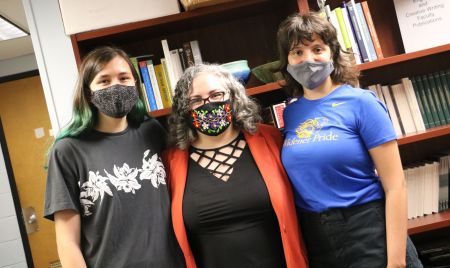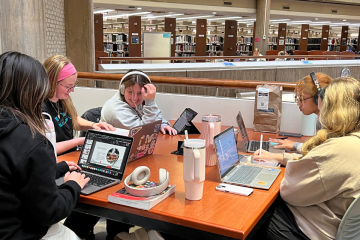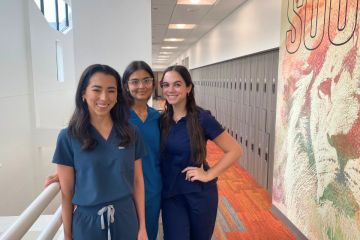Meet the Widener Students and Faculty Launching a National Queer Zine

Widener’s new LGBTQ+ publication – called The Q&A Queer Zine – is quickly becoming a place for queer artists around the nation to express themselves and build community.
Started by juniors Cloë Di Flumeri and Christina Giska, the digital zine is devoted to all forms of queer expression, from prose to poetry to painting, and is staffed by individuals across the country.
We caught up with Di Flumeri, a triple major in political science, international relations, and English, and Giska, a mechanical engineering major and creative writing minor, to learn more about the university’s first LGBTQ+ zine.
Where did the idea for a queer zine come from?
Di Flumeri: In the fall of 2020, I started getting more involved with Widener University’s literary magazines, The Blue Route and Widener Ink. I found publishing to be really rewarding and saw how the submissions built community between readers and contributors.
They are incredible publications, but I wondered: where were the queer stories? Better yet, where were the queer publications? The zine was truly born after I read Boston College’s publication, The Laughing Medusa. It represented the queer expression and community that I wanted to have. I realized it was time to make that happen at Widener.
Giska: Cloë and I are both members of the Sexuality and Gender Alliance (SAGA) and The Blue Route, so she approached me about this project. I was interested because in middle school and high school I had a lot of friends who share my experience of being LGBTQ+. I wanted to find that same kind of support and sense of queer community here at college. We started meeting with Professor Jessica Guzman and working out the details for a zine.
How did you choose the name, The Q&A Queer Zine?
Giska: While the zine is officially based out of Widener University, our staff includes students and individuals from all across the country. We wanted the name to reflect the ideas of the community so we asked people to submit names and did a poll on our website. Voters chose The Q&A Queer Zine.
How has the zine grown as part of Widener’s Summer Undergraduate Research and Creative Activities (SURCA) program?
Di Flumeri: This summer, we are researching the history of queer zines in America and are looking forward to presenting at the SURCA symposium in the fall. I find it really interesting to share our creative project and to hear about other students’ research projects, especially since many of them are in chemistry and biology. It’s good to get outside the bubble of Humanities and learn about student research in other fields. The SURCA stipend also was incredibly supportive in terms of helping us start the zine. We didn’t initially realize how much money it costs to create a digital or print zine.
Assistant Professor Jessica Guzman serves as an adviser for the zine. How has her mentorship and insight helped guide you in this process?
Giska: Dr. Guzman’s experience and knowledge is invaluable to The Q&A. She has worked on other literary magazines and specializes in poetry. She has helped us navigate creating a website and reaching out to faculty and students at other universities to grow the staff and get submissions. We meet with her about once a week in the summer to talk about what we’ve learned about the history of queer zines and to discuss next steps for our own zine. Her support, guidance, and connections have been amazing.
On the zine’s website, you describe The Q&A as a home for queer artists. How has this zine provided you with a sense of belonging and home?
Di Flumeri: The community piece of this zine is so important to me. The zine was founded to give visibility and community presence to Widener’s queer-identifying student body. I know that for a lot of people, including myself, there isn’t always a strong sense of community for LGBTQ+ people. This experience has allowed me to meet other artists and build community across state lines. We are laying a foundation for LGBTQ+ people to feel like they are at home, whether they are here at Widener or elsewhere.
What do you want to tell people who are interested in submitting a written piece or art work to the zine?
Di Flumeri: This space is for any and all queer people who feel that familiar pull toward community. Maybe you live in a region where you’re isolated from other queer people, or maybe you live in a city or a campus with a vibrant LGBTQ+ community. Either way, this is your home.
Visit The Q&A’s website to learn more, and follow on Facebook, Instagram, and Twitter.




